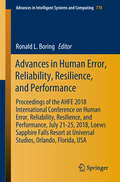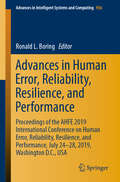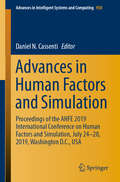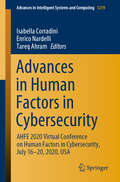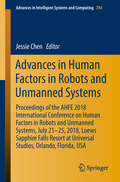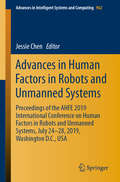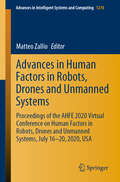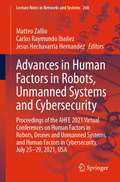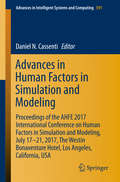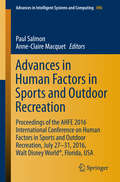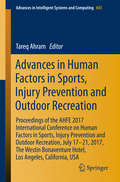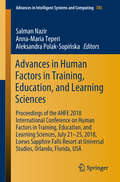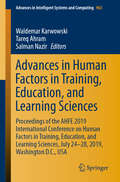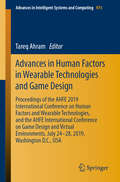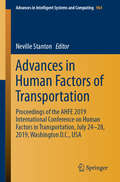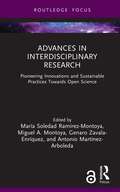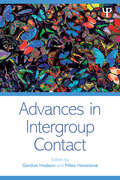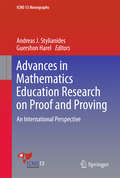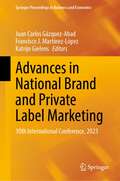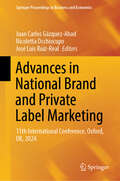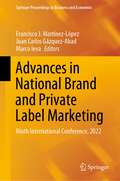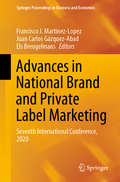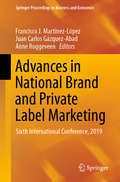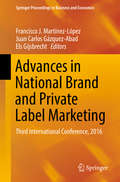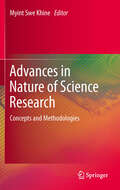- Table View
- List View
Advances in Human Error, Reliability, Resilience, and Performance: Proceedings of the AHFE 2018 International Conference on Human Error, Reliability, Resilience, and Performance, July 21-25, 2018, Loews Sapphire Falls Resort at Universal Studios, Orlando, Florida, USA (Advances in Intelligent Systems and Computing #778)
by Ronald L. BoringThis book brings together studies broadly addressing human error from different disciplines and perspectives. It discusses topics such as human performance; human variability and reliability analysis; medical, driver and pilot error, as well as automation error; root cause analyses; and the cognitive modeling of human error. In addition, it highlights cutting-edge applications in safety management, defense, security, transportation, process controls, and medicine, as well as more traditional fields of application. Based on the AHFE 2018 International Conference on Human Error, Reliability, Resilience, and Performance, held on July 21–25, 2018, in Orlando, Florida, USA, the book includes experimental papers, original reviews, and reports on case studies, as well as meta-analyses, technical guidelines, best practice and methodological papers. It offers a timely reference guide for researchers and practitioners dealing with human error in a diverse range of fields.
Advances in Human Error, Reliability, Resilience, and Performance: Proceedings of the AHFE 2019 International Conference on Human Error, Reliability, Resilience, and Performance, July 24-28, 2019, Washington D.C., USA (Advances in Intelligent Systems and Computing #956)
by Ronald L. BoringThis book brings together studies broadly addressing human error from different disciplines and perspectives. It discusses topics such as human performance; human variability and reliability analysis; medical, driver and pilot error, as well as automation error; root cause analyses; and the cognitive modeling of human error. In addition, it highlights cutting-edge applications in safety management, defense, security, transportation, process controls, and medicine, as well as more traditional fields of application. Based on the AHFE 2019 International Conference on Human Error, Reliability, Resilience, and Performance, held on July 24-28, 2019, Washington D.C., USA, the book includes experimental papers, original reviews, and reports on case studies, as well as meta-analyses, technical guidelines, best practice and methodological papers. It offers a timely reference guide for researchers and practitioners dealing with human error in a diverse range of fields.
Advances in Human Factors and Simulation: Proceedings Of The Ahfe 2017 Conference On Human Factors In Simulation And Modeling, July 17-21, 2017, Los Angeles, California, Usa (Advances in Intelligent Systems and Computing #591)
by Daniel N. CassentiThis book focuses on modeling and simulation research that advances the current state-of-the-art regarding human factors in this area. It reports on cutting-edge simulators such as virtual and augmented reality, on multisensory environments, and on modeling and simulation methods used in various applications, including surgery, military operations, occupational safety, sports training, education, transportation and robotics. Based on the AHFE 2019 International Conference on Human Factors in Simulation and Modeling, held on July 24-28, 2019, in Washington D.C., USA, the book serves as a timely reference guide for researchers and practitioners developing new modeling and simulation tools for analyzing or improving human performance. It also offers a unique resource for modelers seeking insights into human factors research and more feasible and reliable computational tools to foster advances in this exciting research field.
Advances in Human Factors in Cybersecurity: AHFE 2020 Virtual Conference on Human Factors in Cybersecurity, July 16–20, 2020, USA (Advances in Intelligent Systems and Computing #1219)
by Tareq Ahram Isabella Corradini Enrico NardelliThis book reports on the latest research and developments in the field of human factors in cybersecurity. It analyzes how the human vulnerabilities can be exploited by cybercriminals and proposes methods and tools to increase cybersecurity awareness. The chapters cover the social, economic and behavioral aspects of the cyberspace, providing a comprehensive perspective to manage cybersecurity risks. By gathering the proceedings of the AHFE Virtual Conference on Human Factors Cybersecurity, held on July 16–20, 2020, this book offers a timely perspective of key psychological and organizational factors influencing cybersecurity, reporting on technical tools, training methods and personnel management strategies that should enable achieving a holistic cyber protection for both individuals and organizations. By combining concepts and methods of engineering, education, computer science and psychology, it offers an inspiring guide for researchers and professionals, as well as decision-makers, working at the interfaces of those fields.
Advances in Human Factors in Robots and Unmanned Systems: Proceedings of the AHFE 2018 International Conference on Human Factors in Robots and Unmanned Systems, July 21-25, 2018, Loews Sapphire Falls Resort at Universal Studios, Orlando, Florida, USA (Advances in Intelligent Systems and Computing #784)
by Jessie ChenThis book focuses on the importance of human factors in the development of safe and reliable unmanned systems. It discusses current challenges such as how to improve the perceptual and cognitive abilities of robots, develop suitable synthetic vision systems, cope with degraded reliability in unmanned systems, predict robotic behavior in case of a loss of communication, the vision for future soldier–robot teams, human–agent teaming, real-world implications for human–robot interaction, and approaches to standardize both the display and control of technologies across unmanned systems. Based on the AHFE 2018 International Conference on Human Factors in Robots and Unmanned Systems, held on July 21–25, 2018, in Orlando, Florida, USA, this book fosters new discussions and stimulates new advances in the development of more reliable, safer, and highly functional devices for carrying out automated and concurrent tasks.
Advances in Human Factors in Robots and Unmanned Systems: Proceedings of the AHFE 2019 International Conference on Human Factors in Robots and Unmanned Systems, July 24-28, 2019, Washington D.C., USA (Advances in Intelligent Systems and Computing #962)
by Jessie ChenThis book focuses on the importance of human factors in the development of safe and reliable unmanned systems. It discusses current challenges such as how to improve the perceptual and cognitive abilities of robots, develop suitable synthetic vision systems, cope with degraded reliability in unmanned systems, predict robotic behavior in case of a loss of communication, the vision for future soldier–robot teams, human–agent teaming, real-world implications for human–robot interaction, and approaches to standardize both the display and control of technologies across unmanned systems. Based on the AHFE 2019 International Conference on Human Factors in Robots and Unmanned Systems, held on July 24–28, 2019, Washington D.C., USA, this book fosters new discussions and stimulates new advances in the development of more reliable, safer, and highly functional devices for carrying out automated and concurrent tasks.
Advances in Human Factors in Robots, Drones and Unmanned Systems: Proceedings of the AHFE 2020 Virtual Conference on Human Factors in Robots, Drones and Unmanned Systems, July 16-20, 2020, USA (Advances in Intelligent Systems and Computing #1210)
by Matteo ZallioThis book focuses on the importance of human factors in the development of safe and reliable robotic and unmanned systems. It discusses current challenges, such as how to improve the perceptual and cognitive abilities of robots, develop suitable synthetic vision systems, cope with degraded reliability in unmanned systems, and predict robotic behavior in relation to human activities. Further, it highlights potential future human-robot and human-agent collaboration, suggesting real-world implications of and approaches for improving human-machine interaction across unmanned systems. Based on the AHFE 2020 Virtual Conference on Human Factors in Robots, Drones and Unmanned Systems, held on July 16–20, 2020, this book is intended to foster discussion and collaborations among researchers and practitioners, thus stimulating new solutions for the development of reliable and safe, human-centered, highly functional devices to perform automated and concurrent tasks.
Advances in Human Factors in Robots, Unmanned Systems and Cybersecurity: Proceedings of the AHFE 2021 Virtual Conferences on Human Factors in Robots, Drones and Unmanned Systems, and Human Factors in Cybersecurity, July 25-29, 2021, USA (Lecture Notes in Networks and Systems #268)
by Matteo Zallio Carlos Raymundo Ibañez Jesus Hechavarria HernandezThis book focuses on the importance of human factors in the development of safe and reliable robotic and unmanned systems. It discusses solutions for improving the perceptual and cognitive abilities of robots, developing suitable synthetic vision systems, coping with degraded reliability in unmanned systems, and predicting robotic behavior in relation to human activities. It covers the design of improved, easy to use, human–system interfaces, together with strategies for increasing human–system performance, and reducing cognitive workload at the user interface. It also discusses real-world applications and case studies of human-robot and human-agent collaboration in different business and educational endeavors. The second part of the book reports on research and developments in the field of human factors in cybersecurity.Contributions cover the technological, social, economic and behavioral aspects of the cyberspace, providing a comprehensive perspective to manage cybersecurity risks. Based on the two AHFE 2021 Conferences such as the AHFE 2021 Conference on Human Factors in Robots, Drones and Unmanned Systems, and the AHFE 2021 Conference on Human Factors in Cybersecurity, held virtually on 25–29 July, 2021, from USA, this book offers extensive information and highlights the importance of multidisciplinary approaches merging engineering, computer science, business and psychological knowledge. It is expected to foster discussion and collaborations between researchers and practitioners with different background, thus stimulating new solutions for the development of reliable and safe, human-centered, highly functional devices to perform automated and concurrent tasks, and to achieve an inclusive, holistic approach for enhancing cybersecurity.
Advances in Human Factors in Simulation and Modeling: Proceedings of the AHFE 2017 International Conference on Human Factors in Simulation and Modeling, July 17–21, 2017, The Westin Bonaventure Hotel, Los Angeles, California, USA (Advances in Intelligent Systems and Computing #591)
by Daniel N. CassentiThis book focuses on computational modeling and simulation research that advances the current state-of-the-art regarding human factors in simulation and applied digital human modeling. It reports on cutting-edge simulators such as virtual and augmented reality, on multisensory environments, and on modeling and simulation methods used in various applications, such as surgery, military operations, occupational safety, sports training, education, transportation and robotics. Based on the AHFE 2017 International Conference on Human Factors in Simulation and Modeling, held on July 17-21, 2017, in Los Angeles, California, USA, the book is intended as a timely reference guide for researchers and practitioners developing new modeling and simulation tools for analyzing or improving human performance. It also offers a unique resource for modelers seeking insights into human factors research and more feasible and reliable computational tools to foster advances in this exciting research field.
Advances in Human Factors in Sports and Outdoor Recreation: Proceedings of the AHFE 2016 International Conference on Human Factors in Sports and Outdoor Recreation, July 27-31, 2016, Walt Disney World®, Florida, USA (Advances in Intelligent Systems and Computing #496)
by Paul Salmon Anne-Claire MacquetThis book describes cutting-edge applications of human factors for sport and outdoor recreation disciplines and provides practical guidance on a range of methods for describing, representing, and evaluating human, team, and system performance in sports domains. Contributions in this book show how various human factors methods, applied historically in the complex safety critical domains, are suited to describing and understanding sports performance and sports injury prevention. The book discusses a wealth of methods for different purposes, such as data collection, task analysis (including cognitive task analysis), workload measurement, assessing situation awareness, performance assessment (including team performance assessment), decision making and cognition in sports, human error identification, and interface evaluation methods. With respect to other publications in human factors and ergonomics, which have been more focused on the biomechanical, physiological, environmental, and equipment-related aspects of sports performance, this book gives a special emphasis to research on analysis of individual and team sports, cognitive and social human factors, and covers both sports and outdoor recreation disciplines. Based on the AHFE 2016 International Conference on Human Factors in Sports and Outdoor Recreation, held on July 27-31, 2016, in Walt Disney World®, Florida, USA, this book provides readers with a timely survey of new methods that can be implemented during any sport or outdoor recreation event for analyzing and improving the performance and safety of both individuals and teams.
Advances in Human Factors in Sports, Injury Prevention and Outdoor Recreation: Proceedings of the AHFE 2017 International Conference on Human Factors in Sports, Injury Prevention and Outdoor Recreation, July 17-21, 2017, The Westin Bonaventure Hotel, Los Angeles, California, USA (Advances in Intelligent Systems and Computing #603)
by Tareq AhramThis book describes cutting-edge applications of human factors for sports, injury prevention and outdoor recreation disciplines and provide practical guidance on a range of methods for describing, representing, and evaluating human, team, and system performance in various domains. Contributions in this book show how various human factors methods, applied historically in the complex safety critical domains, are suited to describing and understanding sports performance and sports injury prevention. The book discusses a wealth of methods for different purposes, such as data collection, task analysis (including cognitive task analysis), workload measurement, assessing situation awareness, performance assessment (including team performance assessment),decision making and cognition in sports, human error identification, and interface evaluation methods. With respect to other publications in human factors and ergonomics, which have been more focused on the biomechanical, physiological, environmental, and equipment-related aspects of sports performance, this book gives a special emphasis to research on analysis of individual and team sports, cognitive and social human factors, and covers both sports and outdoor recreation disciplines. Based on the AHFE 2017 Conference on Human Factors in Sports, Injury Prevention and Outdoor Recreation, held on July 17-21, 2017, in Los Angeles, California, USA, this book provides readers with a timely survey of new methods that can be implemented during any sport or outdoor recreation event, and for analyzing and improving the performance and safety of both individuals and teams.
Advances in Human Factors in Training, Education, and Learning Sciences: Proceedings of the AHFE 2018 International Conference on Human Factors in Training, Education, and Learning Sciences, July 21-25, 2018, Loews Sapphire Falls Resort at Universal Studios, Orlando, Florida, USA (Advances in Intelligent Systems and Computing #785)
by Salman Nazir Anna-Maria Teperi Aleksandra Polak-SopińskaThis book focuses on the importance of human factors in optimizing the learning and training process. It reports on the latest research and best practices and discusses key principles of behavioral and cognitive science, which are extremely relevant to the design of instructional content and new technologies to support mobile and multimedia learning, virtual training and web-based learning, among others, as well as performance measurements, social and adaptive learning and many other types of educational technologies, with a special emphasis on those important in the corporate, higher education, and military training contexts. Based on the AHFE 2018 Conference on Human Factors in Training, Education, and Learning Sciences, held July 21–25, 2018 in Orlando, Florida, USA on July 21–25, 2018, the book offers a timely perspective on the role of human factors in education. It highlights important new ideas and will fosters new discussions on how to optimally design learning experiences.
Advances in Human Factors in Training, Education, and Learning Sciences: Proceedings of the AHFE 2019 International Conference on Human Factors in Training, Education, and Learning Sciences, July 24-28, 2019, Washington D.C., USA (Advances in Intelligent Systems and Computing #963)
by Salman Nazir Waldemar Karwowski Tareq AhramThis book focuses on the importance of human factors in optimizing the learning and training process. It reports on the latest research and best practices and discusses key principles of behavioral and cognitive science, which are extremely relevant to the design of instructional content and new technologies to support mobile and multimedia learning, virtual training and web-based learning, among others, as well as performance measurements, social and adaptive learning and many other types of educational technologies, with a special emphasis on those important in the corporate, higher education, and military training contexts. Based on the AHFE 2019 Conference on Human Factors in Training, Education, and Learning Sciences, held on July 24-28, 2019, in Washington D.C., USA, the book offers a timely perspective on the role of human factors in education. It highlights important new ideas and will fosters new discussions on how to optimally design learning experiences.
Advances in Human Factors in Wearable Technologies and Game Design: Proceedings of the AHFE 2019 International Conference on Human Factors and Wearable Technologies, and the AHFE International Conference on Game Design and Virtual Environments, July 24-28, 2019, Washington D.C., USA (Advances in Intelligent Systems and Computing #973)
by Tareq AhramThis book focuses on the human aspects of wearable technologies and game design, which are often neglected. It shows how user-centered practices can optimize the wearable experience, thus improving user acceptance, satisfaction and engagement with novel wearable gadgets. It addresses both research and best practices in the applications of human factors and ergonomics to sensors, wearable technologies and game design innovations, as well as new findings on the integration of wearability principles with regard to: aesthetics, affordance, comfort, contextual awareness, customization, ease of use, ergonomics, information overload, intuitiveness, obtrusiveness, privacy, reliability, responsiveness, satisfaction, subtlety, user-friendliness and wearability. Gathering the outcomes of both the AHFE 2019 Conference on Human Factors and Wearable Technologies and the AHFE 2019 Conference on Human Factors in Game Design and Virtual Environments, held on July 24–28, 2019 in Washington, DC, USA, the book addresses the needs of professionals, researchers, and students whose work involves the human aspects of wearable, smart and/or interactive technologies and game design research.
Advances in Human Factors of Transportation: Proceedings of the AHFE 2019 International Conference on Human Factors in Transportation, July 24-28, 2019, Washington D.C., USA (Advances in Intelligent Systems and Computing #964)
by Neville StantonThis book discusses the latest advances in research and development, design, operation and analysis of transportation systems and their complementary infrastructures. It reports on both theories and case studies on road and rail, aviation and maritime transportation. Further, it covers a wealth of topics, from accident analysis, vehicle intelligent control, and human-error and safety issues to next-generation transportation systems, model-based design methods, simulation and training techniques, and many more. A special emphasis is placed on smart technologies and automation in transport, and on the user-centered, ergonomic and sustainable design of transport systems. The book, which is based on the AHFE 2019 International Conference on Human Factors in Transportation, held on July 24-28, 2019, in Washington D.C., USA, mainly addresses the needs of transportation system designers, industrial designers, human–computer interaction researchers, civil and control engineers, as well as vehicle system engineers. Moreover, it represents a timely source of information for transportation policy-makers and social scientists whose work involves traffic safety, management, and sustainability issues in transport.
Advances in Interdisciplinary Research: Pioneering Innovations and Sustainable Practices Towards Open Science (Routledge Research in Higher Education)
by Miguel A. Montoya Ramírez-Montoya, María Soledad Genaro Zavala-Enríquez Antonio Martínez-ArboledaThis book explores methodologies and strategies for enhancing educational practices through interdisciplinary research and open science. Featuring global contributions, it shows how integrating diverse disciplines can drive innovation, improve teaching, and tackle modern educational challenges.The book begins by highlighting the value of interdisciplinary research, technological advancements, and innovative processes for enriching education. It includes theoretical frameworks for frontier research, practical data visualization strategies, and inclusive approaches to diversity in higher education. Readers will find discussions on knowledge transfer for social impact and guidelines for integrating equity, diversity, and inclusion in open education. It also emphasizes academic networking and personal branding, offering insights into fostering collaboration and professional development. This resource highlights both the theoretical and practical benefits of interdisciplinary research and open science.Valuable for researchers, students, and decision‑makers interested in advancing educational research, promoting inclusive practices, and emerging educational technology, this book contributes to the discourse on educational innovation and provides essential tools and concepts for advancing educational research and practice.
Advances in Intergroup Contact
by Miles Hewstone Gordon HodsonIntergroup contact remains one of the most effective means to reduce prejudice and conflict between groups. The past decade has witnessed a dramatic resurgence of interest in this time-tested phenomenon, with researchers now focusing on understanding when, why, and for whom contact does (and does not) work. This new volume focuses on one of the hottest topics in the social sciences: prejudice. Covering not only basic principles but cutting-edge findings and theoretical directions, key questions surrounding this subject are addressed, such as: how perceptions of other groups lead to anxiety and avoidance; how cross-group contact influences the development of prejudice in children; whether highly-prejudiced people benefit from contact; how status and power influence the effectiveness of contact. In addition to exploring methodological challenges facing contact researchers, attention is devoted to prejudice interventions that are rooted in our understanding of contact effects. These range from zero-acquaintance contact to intimate cross-group friendships, and even involve simulated contact experiences. This volume draws together world-renowned experts in prejudice and intergroup contact to provide a long-awaited update on the state of affairs in intergroup contact research. As well as synthesizing and integrating the key topics, it also provides possible new directions for future research. Given the prominence of contact as a powerful prejudice-reduction tool, this book is a must-read for students and scholars of social psychology and sociology, as well as policy-makers and practitioners.
Advances in Mathematics Education Research on Proof and Proving: An International Perspective (ICME-13 Monographs)
by Andreas J. Stylianides Guershon HarelThis book explores new trends and developments in mathematics education research related to proof and proving, the implications of these trends and developments for theory and practice, and directions for future research. With contributions from researchers working in twelve different countries, the book brings also an international perspective to the discussion and debate of the state of the art in this important area. The book is organized around the following four themes, which reflect the breadth of issues addressed in the book: * Theme 1: Epistemological issues related to proof and proving; * Theme 2: Classroom-based issues related to proof and proving; * Theme 3: Cognitive and curricular issues related to proof and proving; and * Theme 4: Issues related to the use of examples in proof and proving. Under each theme there are four main chapters and a concluding chapter offering a commentary on the theme overall.
Advances in National Brand and Private Label Marketing: 10th International Conference, 2023 (Springer Proceedings in Business and Economics)
by Francisco J. Martínez-López Juan Carlos Gázquez-Abad Katrijn GielensThe 2023 International Conference on National Brand & Private Label Marketing is a unique academic forum to present and discuss original, rigorous, and significant contributions from researchers around the world on marketing issues facing retailers, store brand managers and national brand managers. The two-day event covered a wide range of topics from varied fields including retailing, marketing, general business, psychology, economics and statistics. The conference addressed diverse areas of application such as branding strategies, innovation in private labels, private label consumers, customer databases, Covid-19 consequences, loyalty programs, sustainability, and online grocery retailing, among others. A wide variety of theoretical and methodological approached have been used in these areas. This volume presents the proceedings of this 2023 NB&PL marketing conference in a collection of original, rigorous, and relevant contributions.
Advances in National Brand and Private Label Marketing: 11th International Conference, Oxford, UK, 2024 (Springer Proceedings in Business and Economics)
by Juan Carlos Gázquez-Abad Nicoletta Occhiocupo José Luis Ruiz-RealThe 2024 International Conference on National Brand & Private Label Marketing is a unique academic forum to present and discuss original, rigorous, and significant contributions from researchers around the world on marketing issues facing retailers, store brand managers and national brand managers. The three-day event covered a wide range of topics from varied fields including retailing, marketing, general business, psychology, economics, and statistics. The conference addressed diverse areas of application such as customer journey, sustainability, the metaverse, online grocery retailing, assortment branding strategies, innovation, labelling, co-creation, among others. A wide variety of theoretical and methodological approaches have been used in these areas. This volume presents the proceedings of this 2024 NB&PL marketing conference in a collection of original, rigorous, and relevant contributions.
Advances in National Brand and Private Label Marketing: Ninth International Conference, 2022 (Springer Proceedings in Business and Economics)
by Francisco J. Martínez-López Juan Carlos Gázquez-Abad Marco IevaThis proceedings volume highlights the latest research presented at the 9th International Conference on Research on National Brand & Private Label Marketing (NB&PL2022). The topics covered include: retailing, private label portfolio and assortment management, private label pricing and promotion, national brand strategies, among other related issues. The volume specifically addresses the needs of researchers and students of advanced marketing courses.
Advances in National Brand and Private Label Marketing: Seventh International Conference, 2020 (Springer Proceedings in Business and Economics)
by Juan Carlos Gázquez-Abad Francisco J. Martinez-Lopez Els BreugelmansThis proceedings volume highlights the latest research presented at the 7th International Conference on Research on National Brand & Private Label Marketing (NB&PL2020, Barcelona, Spain). The topics covered include: retailing, private label portfolio and assortment management, marketing of premium store brands, using national brands to exclude (delist) and include, optimal assortment size, consumer store patronage, etc. Several contributions also focus on private label pricing and promotion, especially on the relative pricing of standard and premium private labels, and with regard to the national brands in the assortment. Further questions addressed here include: Should store brands be promoted? If so, what types of promotion should be used? How can private label penetration, especially premium private labels, best be dealt with? Are dual branding and coupons viable options?
Advances in National Brand and Private Label Marketing: Sixth International Conference, 2019 (Springer Proceedings in Business and Economics)
by Francisco J. Martínez-López Juan Carlos Gázquez-Abad Anne RoggeveenThe 2019 International Conference on National Brand & Private Label Marketing is a unique academic forum for presenting and discussing original, rigorous and significant contributions from researchers around the world on marketing issues that retailers, store brand managers and national brand managers are facing.The three-day event covered a wide range of topics from varied fields including retailing, marketing, general business, psychology, economics and statistics. Further, it addressed diverse areas of application such as innovation, retail market structure, social media, consumer decision-making, store loyalty, assortment size, digital transformation, ethical aspects, cultural dimensions, and private label pricing. This volume gathers the proceedings of the 2019 NB&PL marketing conference in a collection of outstanding contributions that employ a wide variety of theoretical and methodological approaches.
Advances in National Brand and Private Label Marketing: Third International Conference, 2016 (Springer Proceedings in Business and Economics)
by Francisco J. Martínez-López Juan Carlos Gázquez-Abad Els GijsbrechtThis book presents the latest research on national brand and private label marketing, in the form of original, rigorous and relevant contributions from the 2016 National Brands and Private Label Marketing conference in Barcelona. It covers retailing-related topics, such as brand naming and packaging decisions, price elasticity, positioning, branding, consumer behavior, economic crisis, strategies in growth, and mature private labels.
Advances in Nature of Science Research: Concepts and Methodologies
by Myint Swe KhineThis book consolidates contemporary thinking and research efforts in teaching and learning about the nature of science in science education. The term 'Nature of Science' (NoS) has appeared in the science education literature for many decades. While there is still a controversy among science educators about what constitutes NoS, educators are unanimous in acknowledging the importance of this topic as well as the need to make it explicit in teaching science. The general consensus is that the nature of science is an intricate and multifaceted theme that requires continued scholarship. Recent analysis of research trends in science education indicates that investigation of the nature of science continues to be one of the most prevalent topics in academic publications. Advances in Nature of Science Research explores teaching and assessing the nature of science as a means of addressing and solving problems in conceptual change, developing positive attitudes toward science, promoting thinking habits, advancing inquiry skills and preparing citizens literate in science and technology. The book brings together prominent scholars in the field to share their cutting-edge knowledge about the place of the nature of science in science teaching and learning contexts. The chapters explore theoretical frameworks, new directions and changing practices from intervention studies, discourse analyses, classroom-based investigations, anthropological observations, and design-based research.
